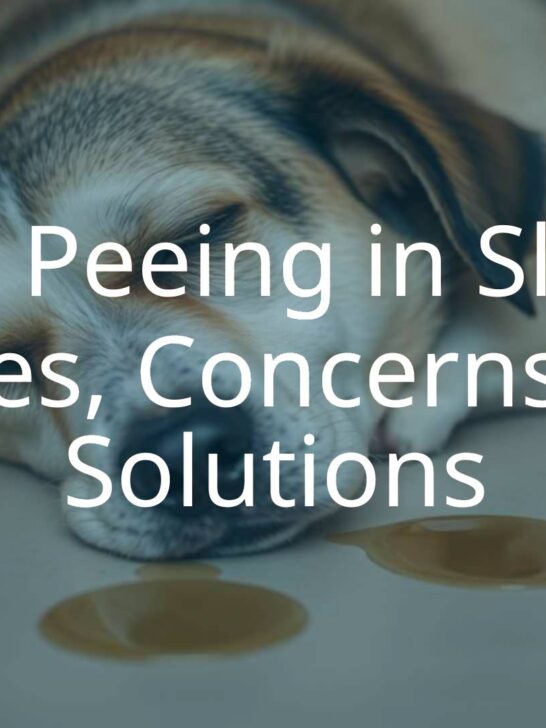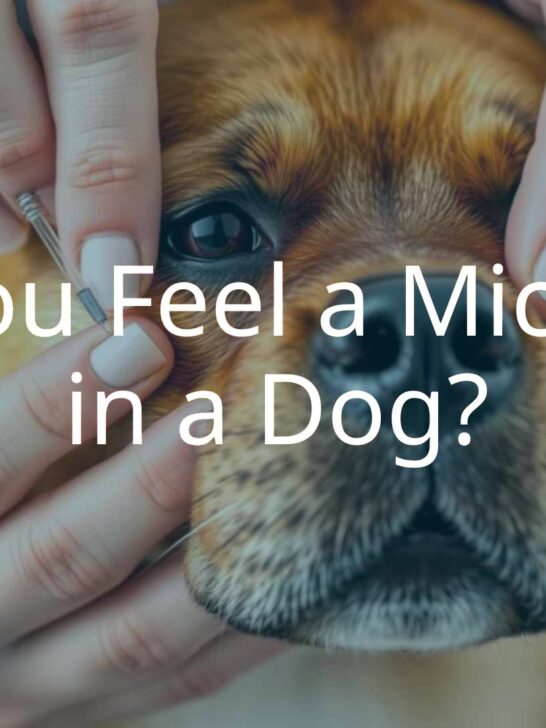Why Does My Dog’s Breath and Urine Smell Like Ammonia?
Did you go to cuddle with your pet recently and recoil at the stench of a rotten egg? It could be a sign your pooch has some problems with their health.
How your dog smells is a crucial indicator of their well-being. So, if you notice your dog smells like ammonia, you must investigate further.
A strong ammonia smell from your dog’s urine, poop, or breath can point to several underlying health issues.
The most common causes of an odor that smells like ammonia are:
- dehydration
- a urinary tract infection
- bladder stones
- advanced kidney failure
This article discusses the potential causes of a pungent smell emanating from your dog’s breath or toxic waste. We also explain how to eliminate ammonia smells from your home.
Let’s dive in!
Reasons Why Your Dog Smells Like Ammonia
Here are five common reasons why your dog’s urine, fart, poop, skin, or breath may smell like ammonia:
1. Dehydration
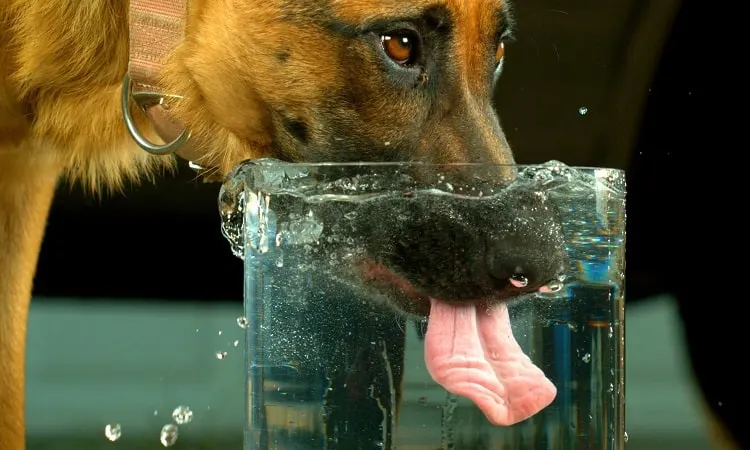
If your dog smells like ammonia, they may be dehydrated. Dehydration often causes elevated levels of glucose and ketones in urine, giving it a more ammonia-like odor.
The causes of dehydration are varied. While it might result from your dog not drinking enough water or exercising too much, more severe factors could also be at play. Some of the most worrying ones are diabetes and kidney disease.
Signs of Dehydration
Dry nose Lethargy Loss of skin elasticity No appetite Panting Sticky gums Thick saliva Vomiting
If your dog’s water bowl is constantly full, encourage them to drink water regularly. You must keep a close eye on and train your dog to remain hydrated.
Make sure that your furry friend drinks water regularly, especially during and after meals and bouts of exercise.
Keep your dog’s water bowl clean and refill it every few hours with fresh water.
You can also add electrolytes to your dog’s water to ensure they get all the nutrients they need.
If you’re very worried, you can take your pet to a local veterinary clinic for a urinalysis. A vet will take a urine sample and test if the pH of the urine and other parameters are in the normal range.
2. Change in Diet
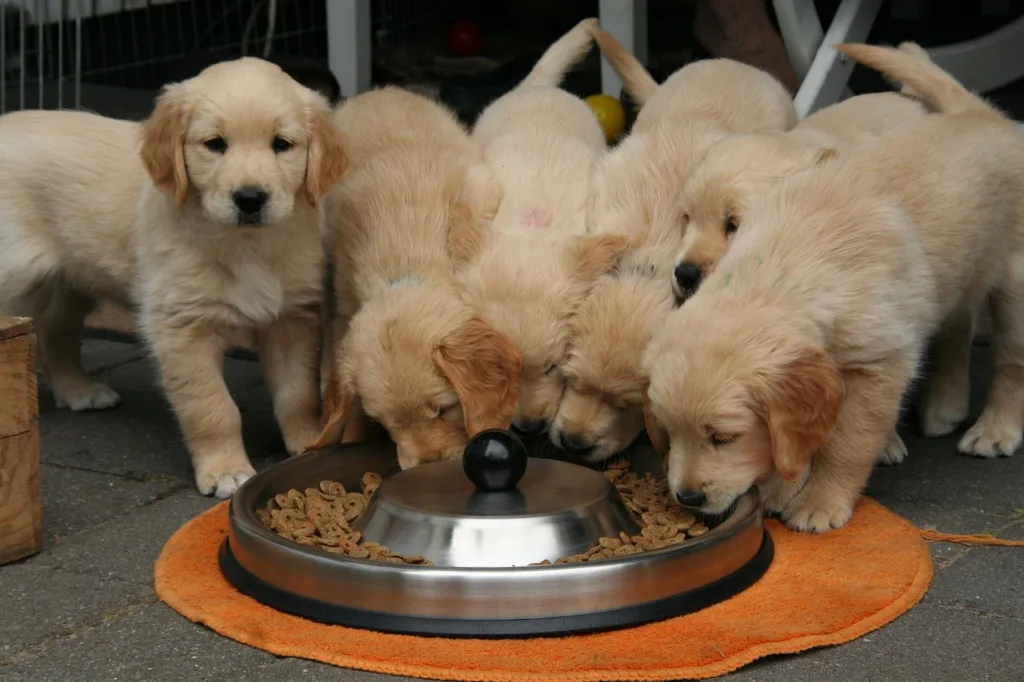
If you’ve recently switched up your brand of dog food, it might be what’s causing your pet’s urine to smell like ammonia. Certain ingredients in your dog’s diet, such as fish or asparagus, can affect the smell of their urine.
For example, if your dog’s food contains too much protein, it can cause an unpleasant odor when they urinate or defecate.
In that case, going away from a high-protein diet is usually enough to get rid of the ammonia smell.
To determine the best course of action, learn about the foods best for your dog’s breed and consult your veterinarian.
If you need to alter your pet’s diet, do it slowly. Mix the new ingredient in small portions over time. Doing so will help your dog transition and prevent the ammonia smell in the future.
If your dog starts to vomit or has an upset stomach during this transition, take it to your vet immediately.
3. Urinary Tract Infection
If your dog’s pee smells like ammonia, the underlying cause of the strong urine smell may be a urinary tract infection (UTI). In this case, you must take your canine companion to a vet and seek medical attention as soon as possible.
Urinary tract infections are caused by bacteria that travel from the bladder to the urinary tract. It can occur in male and female dogs.
Some of the common signs and symptoms of a UTI include:
- Urinating frequently
- Pain while urinating
- Blood in urine
- Straining to urinate
- Fever
- Lethargy
Bear in mind that a female dog’s urine develops a strong smell during her heat cycle to attract mates. You don’t need to worry about infection if your dog shows no signs of illness.
4. Kidney Disease
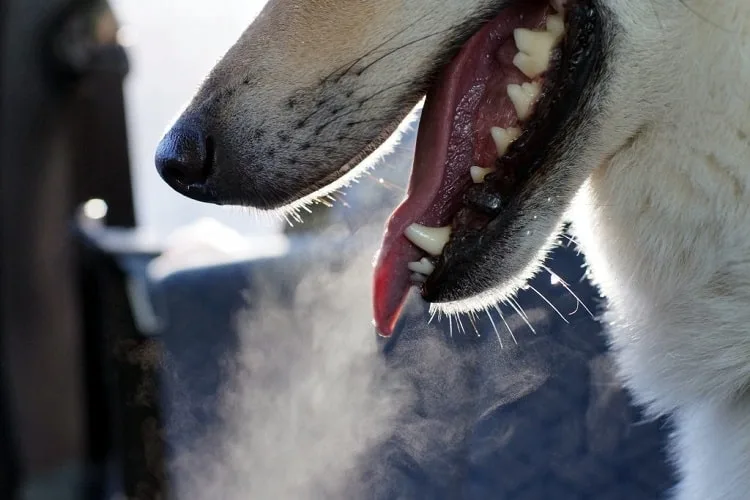
Chronic kidney disease is one of the most common causes of a foul smell in dog urine.
Kidneys are vital organs that filter toxic wastes from a dog’s body and keep it healthy. When they stop working correctly, bacteria accumulate in urine, leading to excess ammonia and a foul odor.
A dog suffering from kidney failure cannot manage protein breakdown products. It results in blood urea nitrogen accumulating in the bloodstream, making the dog smell like ammonia.
Unfortunately, tracking down the cause of the disease can be challenging. The initial symptoms are mild, so they’re easy to miss.
Usually, dog parents begin to notice symptoms only after the kidney disease reaches advanced stages.
Dogs with kidney disease often experience:
- Excessive thirst
- Too much urine
- Too little urine
- Loss of appetite
- Nausea or vomiting
- Fatigue
- Diarrhea
- Muscle cramps
- Sleep problems
- Depression
- Blood in urine
- Sudden weight loss
Kidney disease in dogs can be caused by poor or faulty dental care, which causes bacteria in a dog’s mouth to enter their digestive system. It slows down the ability of the dog’s kidneys to properly filter toxic wastes.
Older dogs are more likely to suffer from kidney disease as their bodily tissues wear with age.
Small breeds are likely to develop the disease once they turn 10, while larger breeds may exhibit signs as early as seven or eight years of age.
5. Bladder Stones
The strong smell of ammonia in dog urine could be due to bladder stones. These stones form in a dog’s bladder and are basically a collection of minerals their body failed to process.
Common symptoms of bladder stones include:
- Ammonia odor in urine
- Abnormal urine color
- Difficulty or pain during urination
Bladder stones may cause a lot of pain for dogs while they urinate. Small stones could leave the bladder and get stuck in the urethra, creating a blockage.
Large stones that cannot pass out of the bladder will stay there. It can result in extreme pain, infection, and partial blockages.
When you suspect your dog might suffer from this condition, take them to the vet immediately.
The veterinarian will use an X-ray to detect bladder stones. They can also determine the best course of treatment for your dog’s situation.
The vet may remove the bladder stones surgically or crush them using ultrasonic waves. If there is little risk for blockage, the vet may prescribe a specific diet to dissolve the crystals and stones naturally.
To prevent bladder stones from developing, avoid giving your dog foods that contain high levels of oxalate. Examples include spinach, sweet potatoes, and wheat germs.
When Should You Call a Vet?
If it’s not dehydration or diet changes making your dog smell like ammonia, take your pet to a vet for a proper check-up.
Any delay in diagnosis and treatment can lead to severe complications.
If your vet suspects that your dog’s breath smells like ammonia due to a medical condition, they will perform the necessary tests and decide on the appropriate treatment plan.
Your dog’s urine may also have an ammonia smell or strong odor if it suffers from yeast infections. It also requires immediate medical care to prevent the condition from worsening.
How to Get Rid of Ammonia Smells at Home
When your home suddenly started smelling like ammonia, you might want to do something about it. Ammonia in your dog’s breath smell, poop smell, or your dog’s farts can be incredibly unpleasant when you share space with them.
Fortunately, you do not have to live with it for long. Taking your dog to the vet will help you solve the root cause of the problem.
Meanwhile, you can take the following steps to eliminate the lingering smell:
- Keep all doors and windows open to encourage air circulation.
- Clean your dog’s pee using a towel, paper towels, or old newspapers.
- After soaking the mess up, sprinkle a little baking soda on the affected spot. Let the baking soda sit overnight, and then vacuum up the area in the morning.
- Mix water and vinegar in a spray bottle and spray it wherever your dog’s smell lingers. It should neutralize the foul odor.
- Use a wet vacuum cleaner to clean up areas where your dog’s urine or poop smells are persistent.
- Create a mixture of 70% water and 30% hydrogen peroxide and use it to dampen a cloth. Blot it on the smelly surface and then rinse with cold water. Repeat several times until you get rid of the smell.
Conclusion
Your dog might start to smell like ammonia due to many reasons. Some of the most common causes include dehydration, diet changes, a urinary tract infection, bladder stones, and kidney disease.
If keeping your pet constantly hydrated and addressing dietary requirements do not help, take it to the vet for expert advice.
Early diagnosis and medical care will help you bring your dog back to good health.
Frequently Asked Questions
How can I get rid of the ammonia smell in my dog’s urine?
To eliminate the ammonia smell in your dog’s urine, it is essential to address the underlying cause.
– If a UTI is the culprit, your vet may prescribe antibiotics to treat the infection.
– In cases of kidney disease, the treatment will depend on the severity and underlying cause of the condition.
– Ensuring your dog drinks plenty of water can help dilute their urine and reduce the odor.
– It is advised to consult with a professional for proper advice and guidance.
Is it normal for dog urine to smell like ammonia?
While a slight odor is normal for dog urine, an intense ammonia smell can be a sign of an underlying issue.
If the smell doesn’t go away or becomes unusually strong, it could indicate a serious problem. Monitor your dog’s urine and consult with a vet if you have any concerns.
What other health conditions can cause a dog’s breath to smell like ammonia?
Besides urinary tract infections and kidney disease, several other health conditions can lead to an unpleasant ammonia-like smell in a dog’s breath. These include diabetes mellitus, periodontal disease, and certain fungal infections.
If you notice a strong ammonia smell in your dog’s breath, have them examined by a veterinarian to determine the underlying cause.
Why does my English Bulldog’s breath and urine smell like ammonia?
English Bulldogs, as well as some other dog breeds, are more prone to certain health issues that can cause an ammonia-like smell in their breath and urine. These can include urinary tract infections, kidney problems, and periodontal disease.
Additionally, the unique anatomy of the English Bulldog, with their wrinkly skin and compacted face, can make them more susceptible to certain health conditions. It is advisable to seek professional advice to determine the cause and appropriate treatment for your English Bulldog’s symptoms.
How do I measure the pH of my dog’s urine?
To measure the pH of your dog’s urine, you can use specially designed pH test strips that are available at most pet supply stores. These strips are typically placed in a sample of your dog’s urine and will change color to indicate the pH level.
What should the pH of a dog’s urine be?
The pH of a dog’s urine can vary depending on several factors, including diet and health.
Generally, a slightly acidic to neutral pH of 6 to 7 is considered normal for dogs. However, it is important to note that the optimal pH range can vary depending on the specific breed and individual dog.
How can I prevent my dog from developing an ammonia smell in their urine?
While it may not be possible to prevent all cases of an unpleasant smell completely, there are some steps you can take to promote good pet health.
Start with providing your dog with a balanced diet, ensuring they have access to clean water, and maintaining proper hygiene. Doing these things can reduce the risk of certain health conditions that can contribute to an ammonia-like smell in dog urine.
Regular veterinary check-ups and prompt treatment of any underlying health issues can also be beneficial in preventing or managing the ammonia smell.














